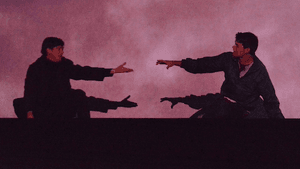Stay in the Loop
BSR publishes on a weekly schedule, with an email newsletter every Wednesday and Thursday morning. There’s no paywall, and subscribing is always free.
A grim forecast
The Wilma Theater presents Andrew Bovell's 'When the Rain Stops Falling'

Don't be late for the Wilma Theater's When the Rain Stops Falling. In its opening moments, Matt Saunders's seemingly plain black set, adorned only with nine randomly strewn wooden chairs lying on their sides, explodes in pouring rain. Eight huge fans stir the air convincingly. Barefoot people wearing black coats huddle under black umbrellas. A man screams. A large fish falls from the sky and lands at his feet.
Thus begins Australian Andrew Bovell's always fascinating, often grim, sometimes confounding drama that spans continents and decades to tell the interconnected stories of four generations of two families.
Not a treatise
Director Blanka Zizka's abstract staging suits the script's minimalist approach. After that first man's long monologue explaining his bleak existence in 2039, it relies on small, seemingly ordinary scenes, often played straight out to the audience without eye contact between characters. The play jumps back and forth from 1988 and 1959 to 2013, eventually returning to 2039. This can be difficult to follow, but our patience is rewarded.
Characters from earlier or later decades walk through scenes like visual echoes matching the dialogue's darkly humorous repetition. The triteness of saying about the endless rain that "there are people drowning in Bangladesh, so we shouldn't complain" becomes meaningful when people in each time repeat this rote sentiment.
Without much direct discussion of the issue, Bovell shows how climate change has been sneaking up on humanity through the 20th century and will soon become a crisis, even mentioning a new epoch, the Anthropocene, which began when humans started significantly impacting Earth's ecosystems. The play is no political or scientific treatise. The characters are ordinary people swept along by change. For them, the relentless rain, like all the gradual effects of climate change, is simply a fact of life.
A skillful production
The actors, many from the Wilma's HotHouse, a company of resident actors training together, perform with genuine passion within the production's heightened style. Their relationships are deep and meaningful, though created with few words and little exposition. Nancy Boykin and Sarah Gliko play the same character, Elizabeth Law, but decades apart, as do Melanye Finister and Taysha Marie Canales as Gabrielle York. They make a quartet of exceptional performances that become more than the sum of their parts. Keith Conallen, Brian Ratcliffe, and Steven Rishard are likewise intense and credible. In smaller but vital roles, Lindsay Smiling as fish-catching Gabriel York and Anthony Martinez-Briggs as his son Andrew represent the culmination of the two families's ill-fated connections.
The Wilma production, as expected, is both technically elaborate yet boldly simple. Saunders's black walls have a higher white level, on which clouds are sometimes projected, and which also reveals majestic Uluru (Ayers Rock), a huge reddish outcropping in the Australian desert central to the story. Lighting designer Yi Zhao keeps the stage appropriately dark, subtly highlighting characters so they're visible without compromising that gray rainy afternoon feeling. Vasilija Zivanic's costumes are likewise in muted colors. Christopher Colucci's sound design is both subtle and strong.
When the Rain Stops Falling asks if humankind, in matters both global and personal, can change our ways in time to save ourselves. "I have such a yearning," says one character, "to be more than I am." Can we? Will we?
What, When, Where
When the Rain Stops Falling. By Andrew Bovell. Blanka Zizka directed. Through November 6, 2016 at the Wilma Theater, 265 S. Broad Street, Philadelphia. (215) 546-7824 or wilmatheater.org.
Sign up for our newsletter
All of the week's new articles, all in one place. Sign up for the free weekly BSR newsletters, and don't miss a conversation.

 Mark Cofta
Mark Cofta